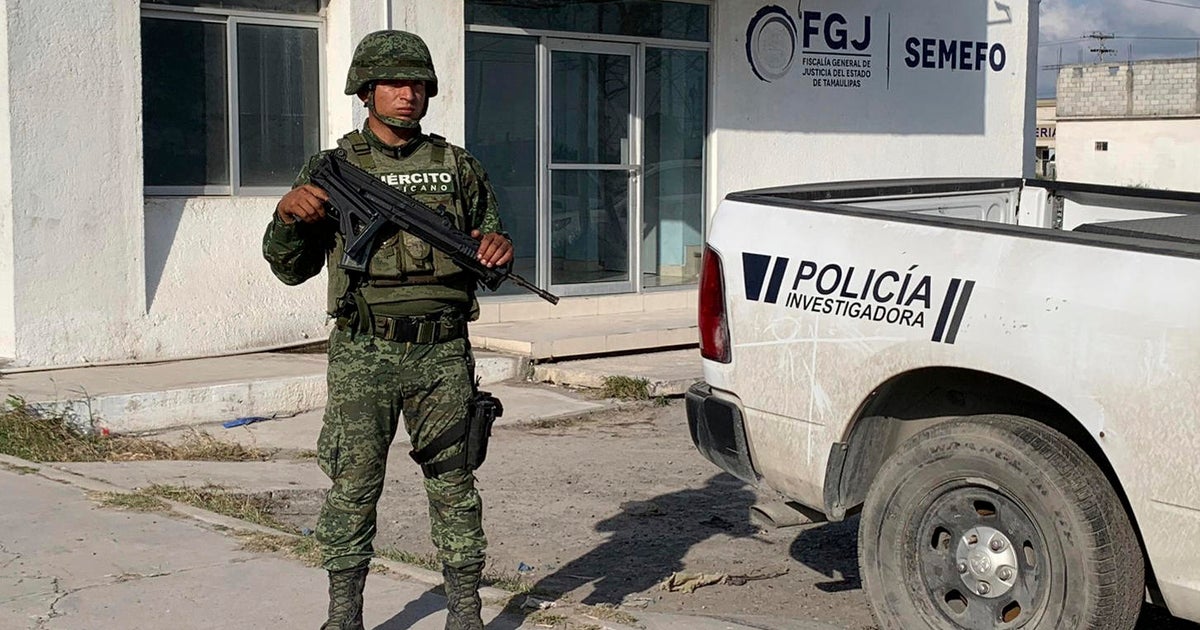CBS News
Hacked-up bodies found inside coolers aboard trucks — along with warning message from Mexican cartel

An undetermined number of hacked-up bodies have been found in two vehicles abandoned on a bridge in Mexico’s Gulf coast state of Veracruz, prosecutors said Monday. A banner left on one of the vehicles included an apparent warning message from a powerful cartel.
The bodies were found Sunday in the city of Tuxpan, not far from the Gulf coast. The body parts were apparently packed into Styrofoam coolers aboard the two trucks.
A printed banner left on the side of one truck containing some of the remains suggested the victims might be Guatemalans, and claimed authorship of the crime to “the four letters” or The Jalisco New Generation Cartel, often referred to by its four initials in Spanish, CJNG.
Prosecutors said police found “human anatomical parts” in the vehicles, and that investigators were performing laboratory tests to determine the number of victims.
A photo of the banner published in local media showed part of it read “Guatemalans, stop believing in Grupo Sombra, and stay in your hometowns.”
Grupo Sombra appears to be a faction of the now-splintered Gulf cartel, and is battling Jalisco for turf in the northern part of Veracruz, including nearby cities like Poza Rica.
“There will be no impunity and that those responsible for these events will be found,” the Attorney General’s Office of the State of Veracruz said in a social media post.
There have been instances in the past of Mexican cartels, and especially the CJNG, recruiting Guatemalans as gunmen, particularly former special forces soldiers known as “Kaibiles.”
“Settling of scores”
The Veracruz state interior department said the killings appeared to involve a “settling of scores” between gangs.
“This administration has made a point of not allowing the so-called ‘settling of scores’ between criminal gangs to affect the public peace,” the interior department said in a statement. “For that reason, those responsible for the criminal acts between organized crime groups in Tuxpan will be pursued, and a reinforcement of security in the region has begun.”
Veracruz had been one of Mexico’s most violent states when the old Zetas cartel was fighting rivals there, and it continues to see killings linked to the Gulf cartel and other gangs.
The state has one of the country’s highest number of clandestine body dumping grounds, where the cartels dispose of their victims.
Getty Images
Discoveries of mutilated bodies dumped in public or hung from bridges with menacing messages have increased in Mexico in recent years as criminal gangs seek to intimidate their rivals.
Last July, a violent drug cartel was suspected of leaving a severed human leg found hanging from a pedestrian bridge in Toluca, just west of Mexico City. The trunk of the body was left on the street below, near the city’s center, along with handwritten messages signed by the Familia Michoacana cartel. Other parts of the bodies were found later in other neighborhoods, also with handwritten drug cartels signs nearby.
In 2022, the severed heads of six men were reportedly discovered on top of a Volkswagen in southern Mexico, along with a warning sign strung from two trees at the scene.
That same year, the bodies of seven men were found dumped on a roadway in the Huasteca region. Writing scrawled in markers on the corpses said “this is what happened to me for working with the Gulf,” an apparent reference to the Gulf Cartel.
AFP contributed to this report.
CBS News
Here Comes the Sun: Jack Antonoff and more

Watch CBS News
Be the first to know
Get browser notifications for breaking news, live events, and exclusive reporting.
CBS News
Capturing Moriah Wilson’s Killer – CBS News

Watch CBS News
Be the first to know
Get browser notifications for breaking news, live events, and exclusive reporting.
CBS News
How to watch the Minnesota Vikings vs. Chicago Bears NFL game today: Livestream options, more

Getty Images
The Minnesota Vikings will take on the Chicago Bears today. The Vikings are currently 8-2, an impressive run so far this season, and will be looking to add a fourth win to their current streak after last Sunday’s 23-13 win against the Tennessee Titans. The Bears, on the other hand, are entering this game on the heels of a four-game losing streak after a tough 20-19 loss against the Green Bay Packers last Sunday.
Here’s how and when you can watch the Vikings vs. Bears game today, whether or not you have cable.
How and when to watch the Minnesota Vikings vs. Chicago Bears
The Vikings vs. Bears game will be played on Sunday, November 24, 2024 at 1:00 p.m. ET (11:00 a.m. PT). The game will air on Fox and stream on Fubo and the platforms featured below.
How and when to watch the Minnesota Vikings vs. Chicago Bears game without cable
You can watch this week’s NFL game on Fox via several streaming services. All you need is an internet connection and one of the top options outlined below.
Fubo offers you an easy, user-friendly way to watch NFL games on CBS, Fox, NBC, ABC, ESPN, and NFL Network, plus NCAA football channels. The Pro tier includes 200+ channels and unlimited DVR, while the Elite with Sports Plus tier adds NFL RedZone and 4K resolution. New subscribers get a seven-day free trial and all plans allow streaming on up to 10 screens simultaneously.
You can watch today’s game with a subscription to Sling’s Orange + Blue tier, which includes ESPN, ABC, NBC, and Fox. The plan offers 46 channels with local NFL games, nationally broadcast games and 50 hours of DVR storage. For complete NFL coverage, add Paramount+ to get CBS games, or upgrade with the Sports Extra add-on for additional sports channels like Golf Channel, NBA TV and NFL RedZone.
Watching NFL games, including Fox broadcasts, is simple with Hulu + Live TV, which includes 90 channels, unlimited DVR storage, and access to NFL preseason games, live regular season games and studio shows. The service includes ESPN+ and Disney+ in the subscription.
Want to watch today’s game live on your smartphone? If so, NFL+ streaming service is the solution you’re looking for. It lets you watch NFL Network and out-of-market games on mobile devices, with an upgrade option to NFL+ Premium that includes NFL RedZone for watching up to eight games simultaneously. Note that NFL+ only works on phones and tablets, not TVs.










